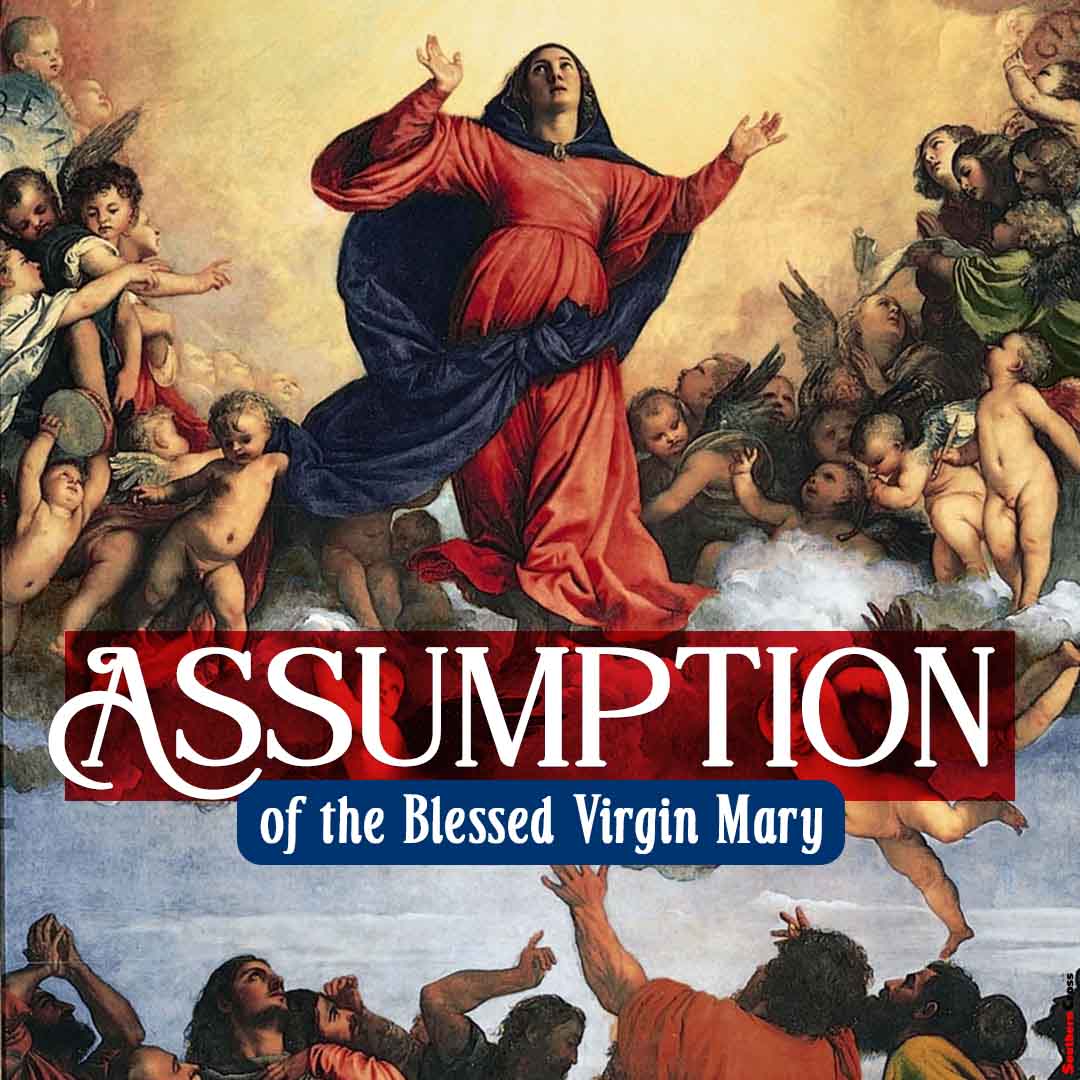The Victory of God! Assumption of The Blessed Virgin Mary
 Sermon by Emmanuel Suntheni OSB – The Assumption of The Blessed Virgin Mary
Sermon by Emmanuel Suntheni OSB – The Assumption of The Blessed Virgin Mary
Sermon And Christian Act In The Word
Theme: “The Assumption of the Blessed Virgin Mary! The Victory of God! Mary-Full of Grace
Point of Reflection: Today’s solemnity celebrates the Assumption of the Blessed Virgin Mary. Assumption means that Mary was taken to the heavenly world with her body and soul. While focused on Mary, today’s feast is ultimately a celebration of God’s victory over all that destroys or distorts the lives of his people and, indeed, his creation. This is well reflected in the scriptural readings of today.
First Reading: Revelation 11:19, 12:1–6, 10
Psalm: Psalm 45:10–12, 16
Second Reading: 1 Corinthians 15:20–27
Gospel: Luke 1:39–56
Sermon (Reflection): Today’s feast of the Assumption, while focusing on Mary, celebrates God’s ultimate triumph. Remembering Mary’s assumption, believers are invited to contemplate their own eternal destiny. Taking Mary to heaven with her body, God showed his authority over death and evil. In her, the one who was “full of grace”, God’s grace triumphed over death. Today’s readings offer a panoramic view of this victory, which will eventually extend to all humanity.
Today’s Gospel passage contains yet another proclamation of God’s victory in which Mary was crucially involved. First, Luke narrates the meeting of two women whom God chose as mothers of his emissaries, thus, Elizabeth, the mother of John the Baptist and Mary, the mother of Jesus. Elizabeth calls Mary “blessed” because she carries in her womb God’s ultimate blessing for humanity, thus, Jesus, God’s Saviour and Messiah. Mary is also blessed because, believing the angel’s words at the annunciation, she willingly accepted her difficult role as the mother of the Saviour. In this way, she made it possible for God’s ultimate blessing to come into the world.
Mary responded with a hymn of praise and victory. Her song resembles similar biblical victory songs pronounced by three other women – Miriam (Cf. Exodus 15:1-18), Hannah (Cf. 1 Samuel 2:1-10) and Judith (Cf. Judith 16:1-17). These women celebrated God’s salvific and life-giving interventions in their personal lives and the history of Israel. Like them, Mary will praise God for three of his salvific acts.
First, Mary praises God for choosing her as the mother of the Savior. She speaks of her “lowliness”; after all, she was an insignificant Galilean peasant woman. Yet, by choosing her, God transformed her insignificance and obscurity into greatness to the point that she will be known and proclaimed as “the blessed one” for all generations.
Mary then speaks about how God comes to the rescue of those who “fear him”, his faithful, suffering under the yoke of oppression and exploitation by the wealthy and powerful of this world. Mary praises God for his victory over those oppressors resulting in a radical reversal of fortunes. Those tormentors will lose their positions and power, while God’s faithful will be restored and elevated.
Finally, Mary looks at her own nation, the Israelites, who have always lived a precarious existence, surrounded by vicious enemies and threatened with destruction. Mary praises God for his mercy shown to Israel. In the Scripture, mercy always involves preserving and sustaining life. God showed mercy by time and time again rescuing and sustaining the nation throughout its long and turbulent history. Referring to God’s promise to Abraham, Mary praises God’s faithfulness in the past, and affirms that his mercy will continue into the future; God will prevail over any power that might seek to destroy his people. Thus, Mary’s song of praise and her own life story is a proclamation of God’s salvation and victory continually occurring amid the human family.
The first reading of today comes from the book of Revelation, which represents a type of literature known as apocalyptic. Apocalypses employ imaginative and often frightening visions and symbolic language to communicate their message. The vision in today’s reading symbolically presents the beginning of the final conflict between God and evil. It also aims to explain to the faithful why they are experiencing attacks of evil in this world.
As Christians, are we not conflicting our minds between evil and God?
This spectacular vision where a frightening dragon attempts to destroy a newly born child. The mother of the child appears as a cosmic queen, wearing a crown of twelve stars, with the sun as her garment, and the moon as her footstool. This explains the story of God’s Messiah, as is made clear by the last verse of our passage. The woman who gives birth to the Messiah is often identified with Mary, the mother of Jesus. However, this woman can also represent the people of Israel, as suggested by her crown made of twelve stars and her life in the desert. The twelve stars symbolise the twelve tribes of Israel, while the desert alludes to the Exodus.
Both interpretations are possible, while the message is clear – God’s Messiah came out of Israel; he was born out of an Israelite woman. He could be no other but Jesus.
The dragon, who symbolises Satan, the chief enemy of God and his people, attempted to destroy the child, who was rescued by God and taken to God’s throne. This vision also explains why Christians in the world are afflicted by evil while assuring them that God’s final victory is on the way. Satan and his agents have already been defeated by the Messiah’s death and resurrection. They are powerless against God, but still, they torment the faithful on earth. However, their fate has already been decided. It will come through the same Jesus, who died, defeated death and evil through his resurrection, ascended to God and will return to complete his work of salvation. This process, however, began with his coming into the world in human flesh. Therefore, Mary, an Israelite woman who brought him into the world, played a vital role in making possible God’s final victory through Jesus.
In the second reading from the letter of Paul to the Corinthians, Paul sought to provide them with a comprehensive and correct understanding of their ultimate fate. He begins with the resurrection of Jesus, whom Paul calls “the first fruits of those who died”. Jesus truly died, but God brought him back from the dead, thus breaking its power. Since death came into the world as a result of Adam’s sin, all who share his human body die. However, all who are “in Christ” risen from the dead will be made alive again. This resurrection of the faithful will take place at the time of Jesus’ return at the end of times”, called Parousia.
Whatever we are doing and saying as Christians, our focus is on the second coming of Jesus Christ which is the Porousia. Are we ready in our hearts to receive Christ again?
Christian Act in Word of God “Mary full of Grace taken to Heaven”
The first lady of a country would normally be accorded reverence and honour on account of her unique relationship with a sitting president. She would normally have access to the presidential palace without hindrance. If a first lady has access to a presidential palace, then Mary, who is much more than a first lady, has greater access to the residence of her Son. We believe that after her earthly life had run its course, the mother of Jesus was taken body and soul into heaven.
The relationship between the Blessed Virgin Mary and Jesus Christ is deeper than any human relationship we can conceive. Biologically, the bones and flesh of the human Jesus were all taken from Mary since Jesus had no human father. Spiritually, the relationship between Mary and Jesus was grounded on Mary’s deep faith in the word of God (cf. Lk 1:38.45).
Mary is one of us, a created human being. However, in pondering over her story, we come to see what the grace of God can do when we enter into a relationship with the Word of God. It is transformative and makes us permanent citizens of the Kingdom of Heaven.
Elizabeth considered the visit of Mary to her as honourable because of the latter’s relationship with the Lord; she called Mary “the Mother of the Lord”. It is no surprise that in the Gospel text, Mary is singled out of all women and called “Blessed among women”. Such a description makes her stand tall among the inhabitants of the Kingdom of Heaven.
The solemnity of the assumption of Mary fills every believer in Christ with the virtue of hope. In the person of Mary, we see the victory of God among humanity. In the person of Mary, we see that a seed that has life in itself rises to new life in the soil of death. Where Mary is right now, we too hope to be when our lives here on earth dovetails into eternity.
Action: I will allow the will of God to be done to me.
Prayer: O Loving Father, make my heart as docile as that of the Blessed Virgin Mary, that we may always say, “be it done unto me according to your word”, for in your will lies my salvation. In the name of Jesus Christ, we pray, Amen.
- A Year of Grace and Peace: Mary, Mother of God - December 31, 2025
- Places of Love and Peace: The Holy Family - December 27, 2025
- The King of Glory is Born: Christmas Day Mass - December 24, 2025





